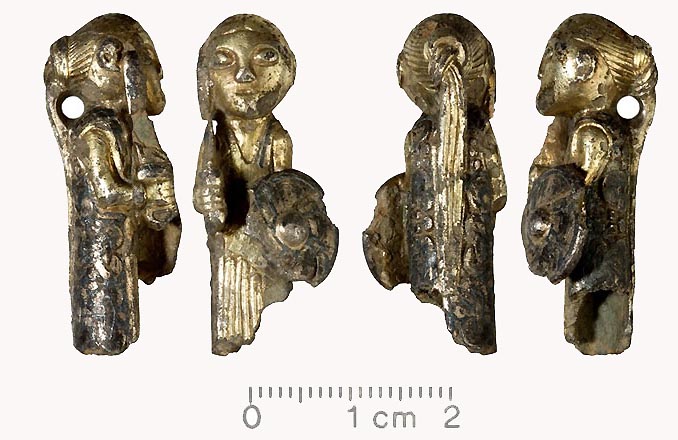Little silver pendant, representing an armed Valkyrie, dating to about
the IX century and discovered in 2012 near Hårby, on the island
of Funen, Denmark. The object is actually housed in the National Museum,
Copenhagen, Denmark.
The Valkyrie were goddesses who established the fate of the heroes in
battle, their name meaning literally “Choosers of the Slain”,
and thus they disclosed to the valiant dead the gates of Valhöll
(Valhalla). As epiphanies of the divine, they were called “white”
or “bright” and sometimes appeared in the shape of swans.
For their warrior qualities they were frequently represented fully armed
and riding mounts which could travel in the air and on the water. Some
of them could become the protectors of particular heroes. According
to Snorri, “them send Odin to every fight, they choose those men
that are doomed to die and sway the victory”. Furthermore, they
have the duty “to serve in Valhalla, bear drink and tend the board
gear and ale horns” (Gylfaginning, 36).
In the Celtic world there were several figures of warrior goddesses,
like Brigit, the Irish Badb, the Gaulish Cathubodua, and above all the
Mórrígan, the goddess of the battle who could assume the
shape of various animals and was regarded as triple. In the epic narratives,
several figures of warrior women are found, like the queen Medb of Connacht,
who led her army against the enemies, or the heroine Scáthach
(“Shadowy One” or “Dark One”), who dwelt in
the Island of Skye, off the coast of Scotland, which took its name from
her, and who knew the secrets of transforming the young warriors into
heroes and had among her pupils the great hero Cú Chulainn (Monaghan
2004).
[Image: http://www.thehistoryblog.com/archives/23915]


